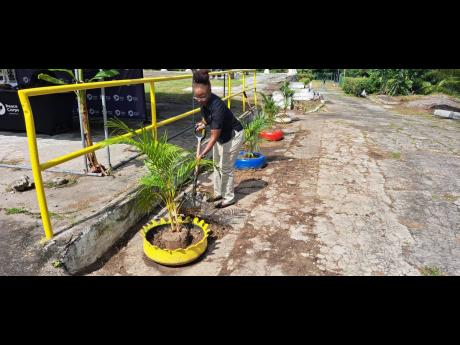The impact of climate change on food security in Jamaica
An essay by Jayda Williams and Brittany McLeggon
Grade 9 students at St Mary Technical High School
Climate change has become one of the most pressing challenges of our time, with its consequences felt around the world. One such consequence is its impact on food security, particularly in vulnerable regions like Jamaica. As temperatures rise, extreme weather conditions become more frequent, and as sea levels continue to rise, the agricultural sector in Jamaica is facing significant challenges that threaten food security and production.
Jamaica is known for its fertile soil and diverse agricultural practices. It relies heavily on agriculture for both food production and economic stability. However, climate change is disrupting this once-thriving sector and jeopardising the country’s ability to feed its population and maintain its export industries.
One of the many impacts of climate change on food security is extreme weather events such as hurricanes and droughts. These events not only damage crops but also destroy critical infrastructure and disrupt the entire food supply chain. For example, hurricanes can destroy farms, irrigation systems, and transportation networks, making it difficult for farmers to grow and distribute their produce. Drought, on the other hand, can lead to water shortages, which are essential for crop growth and livestock rearing.
Rising temperatures also pose a threat to Jamaica’s agriculture sector. Heat waves and prolonged periods of high temperatures can have detrimental effects on crop yields and quality. Some crops, such as cocoa and coffee, are particularly sensitive to temperatures, which can lead to increased pest infestation and the spread of plant diseases, further reducing agricultural productivity.
SIGNIFICANT CONCERN
Another significant concern is the impact of climate change on Jamaica’s coastal areas. Rising sea levels and increased storm surges pose a threat to low-lying agricultural lands, especially those located near the coast. Salt-water intrusion into the freshwater sources can contaminate irrigation water and render soils unsuitable for farming. In addition, erosion caused by coastal flooding can destroy farmlands. This makes it even more challenging for farmers to produce enough food.
The consequences of these climate change impacts on food security are far-reaching. Inadequate access to nutritious food can lead to malnutrition, especially among vulnerable populations such as children and the elderly. Moreover, Jamaica heavily depends on impacted food to meet its dietary needs, and climate change-related disruptions in global food supply chains can further exacerbate food insecurity in the country.
To address those challenges, Jamaica needs to implement a comprehensive and multifaceted approach. First and foremost, there is a need for investment in climate-resilient agricultural practices and technologies. This includes promoting and improving water management systems and adopting sustainable farming practices that minimise greenhouse gas emissions.
Additionally, policymakers need to prioritise the development of climate change adaptation and mitigation strategies that specifically target the agricultural sector. This can involve the establishment of early warnings for extreme weather events, the provision of financial support and insurance schemes for farmers, and the promotion of sustainable land management practices.
This is the first in a series of winning essays from Highgate Youth Climate Change Expo & Fair organised by Peace Corps Jamaica. Send feedback to jamaica@peacecorps.gov and follow them on Facebook: PeaceCorpsJamaica; X, formerly Twitter: PC_Jamaica; Instagram: peacecorpsjamaica or their YouTube channel: https://www.youtube.com/channel/UCatWPfugeTaZ90flVSXBdRA



